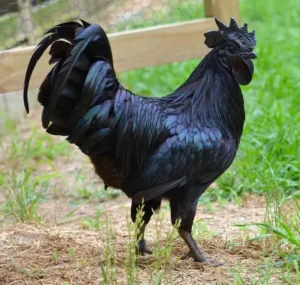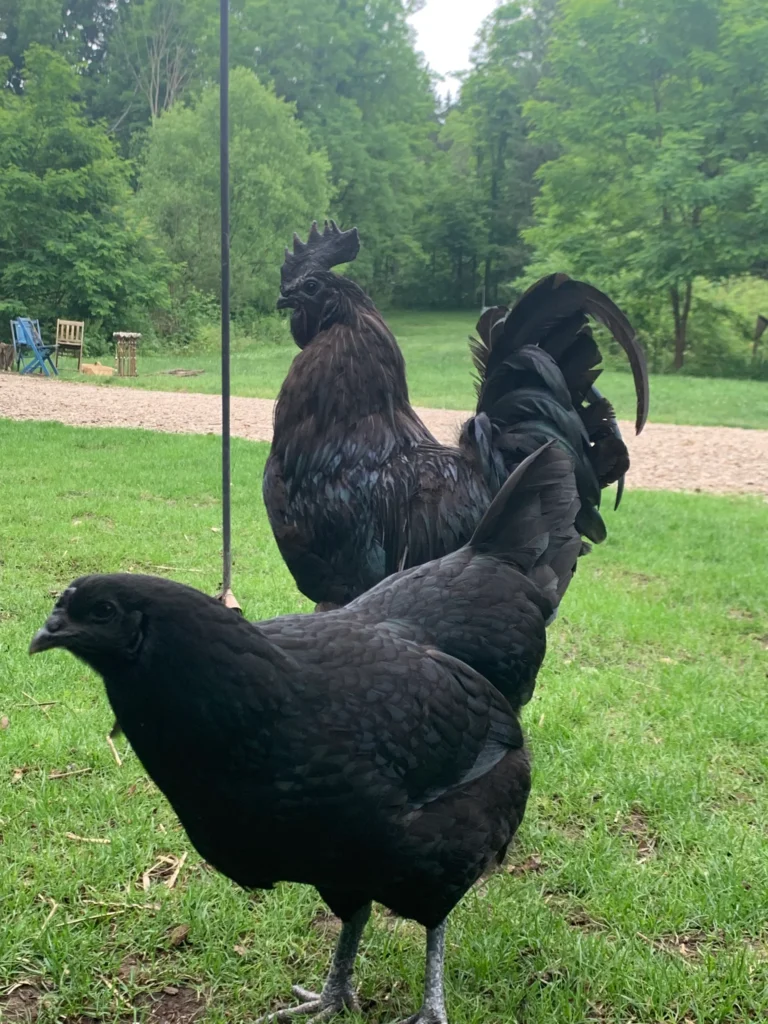Uncategorized
🖤 Meet the Lamborghini Chicken: The Ultimate Status Symbol for Backyard Flocks
🐔 Introduction
In the world of poultry, few birds can rival the mystique and beauty of the Ayam Cemani — often called the Lamborghini of chickens. With its jet-black feathers, black bones, and sleek elegance, this rare Indonesian breed has become the ultimate status symbol for backyard chicken keepers and heritage breeders alike.
For those building a heritage poultry farm or curating a standout flock, the Ayam Cemani brings an unmatched blend of rarity, science, and visual drama that turns any coop into a showpiece.
⚫ What Makes the Ayam Cemani the “Lamborghini Chicken”?
The nickname “Lamborghini chicken” isn’t just a social media gimmick — it’s earned. This breed’s striking appearance, exclusivity, and luxury-level price tag make it the poultry world’s version of a supercar.
-
Jet-black plumage with a metallic green or purple sheen
-
Rarity and exclusivity, with breeding pairs often selling for hundreds or even thousands of dollars
-
Instant prestige among collectors, breeders, and poultry enthusiasts
Like a luxury car, the Ayam Cemani combines beauty, engineering (in this case, genetics), and reputation.
🧬 The Science Behind the Black
What truly sets the Ayam Cemani apart is its fibromelanosis — a rare genetic condition that causes hyperpigmentation. Unlike other black-feathered chickens, the Cemani’s skin, muscles, organs, and even bones are black due to an overproduction of melanin.
Only the blood remains red.
This all-black effect gives the breed its “gothic” appeal and contributes to the myths surrounding it. In its native Indonesia, the Ayam Cemani has long been revered as a sacred bird, believed to bring luck, power, and prosperity.
🏆 Why the Ayam Cemani Is a True Status Symbol
1. Rarity and Price
Purebred Ayam Cemanis are incredibly rare outside Southeast Asia. In North America and Europe, pure, certified lines can cost anywhere from $500 to $2,500 per bird depending on genetics and breeding quality.
2. Exotic Appeal
Every part of this bird looks extraordinary. Visitors to your farm will be mesmerized by its shimmering, ink-black feathers — especially in sunlight when purple and green hues emerge.
3. Symbolism and Heritage
In Javanese culture, Ayam Cemanis were once owned by royalty and spiritual leaders. Today, owning one still represents exclusivity and status, not unlike a classic heritage breed in the poultry world.
4. Marketing Power for Farms
For breeders, the “Lamborghini chicken” can serve as a marketing magnet — drawing attention on social media, at farmer’s markets, and during farm tours. It instantly sets your brand apart as a heritage poultry destination.

🥚 Facts & Care Tips for Potential Owners
Owning Ayam Cemanis requires both admiration and understanding. Here’s what to know before you add one to your flock.
🐣 Temperament
Ayam Cemanis are typically calm, alert, and curious. They handle well and adapt to confinement or free-range environments, making them manageable even for small-scale backyard setups.
🌡️ Climate & Housing
Because their black feathers absorb more heat, shade and ventilation are essential during hot months. Keep the coop airy and provide fresh water at all times.
🍽️ Feeding
Feed them a high-quality layer or breeder feed, with grit and calcium supplements. Their diet doesn’t differ much from other chickens, but superior nutrition maintains their glossy plumage.
🥚 Egg Production
Despite myths, Ayam Cemanis do not lay black eggs. Hens produce about 80–120 cream-colored eggs annually, so they’re more ornamental than production-focused.
🧬 Breeding
Maintaining pure fibromelanistic traits takes careful selection. Many chicks display “leakage” (light-colored patches), which breeders avoid when building true lines.
🌿 The Ayam Cemani and Heritage Poultry Farming
At a heritage poultry farm, adding Ayam Cemanis can elevate your flock both visually and genetically. Here’s how:
-
Conservation: Breeding Ayam Cemanis helps preserve genetic diversity within global poultry populations.
-
Education: Visitors love learning about the genetics of fibromelanosis — a fascinating case of natural mutation.
-
Branding: Featuring an Ayam Cemani as your “signature bird” makes your farm stand out instantly.
-
Sustainability: Raising rare breeds responsibly supports ethical poultry breeding practices.
If your mission is to promote heritage and biodiversity, the Ayam Cemani fits perfectly. It’s not just a fashion statement — it’s a living emblem of natural wonder.
📸 The Instagram Star of the Coop
In the age of social media, few chickens photograph as beautifully as the Ayam Cemani. Its metallic black feathers gleam under natural light, making it one of the most photogenic poultry breeds in existence.
Pair this with their rarity and mystique, and it’s no surprise that the hashtag #LamborghiniChicken trends regularly among breeders and farm influencers.
If your farm uses social media marketing, high-quality photos of your Cemanis can help attract followers, potential buyers, and even media coverage.
💬 Common Myths — Debunked
-
“They have black blood.” False — their blood is red like any other chicken’s.
-
“They lay black eggs.” False — their eggs are cream or tinted white.
-
“They’re aggressive.” False — they’re generally calm and people-friendly.
-
“They’re just hype.” False — their genetics are scientifically unique and verifiable.
🪶 Final Thoughts
The Ayam Cemani is more than a novelty bird. It’s living art — a combination of rare genetics, cultural heritage, and pure aesthetic wonder. Whether you’re building a brand for your heritage poultry farm or looking to make your backyard flock unforgettable, the “Lamborghini chicken” delivers beauty, story, and status in one elegant package.
At the end of the day, the Ayam Cemani isn’t about boasting. It’s about appreciation — for history, biodiversity, and the quiet power of nature’s most luxurious creation.

